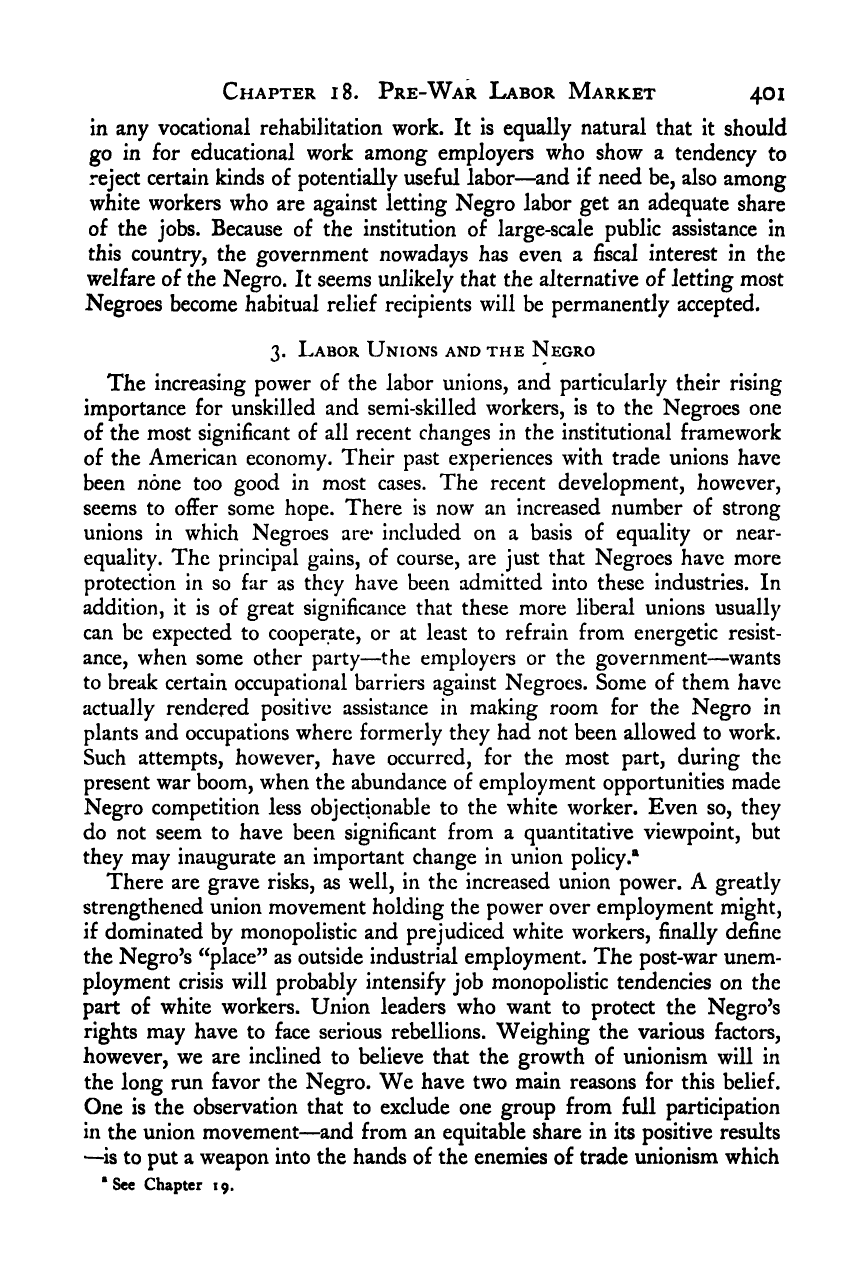Note: Gunnar Myrdal died in 1987, less than 70 years ago. Therefore, this work is protected by copyright, restricting your legal rights to reproduce it. However, you are welcome to view it on screen, as you do now. Read more about copyright.
Full resolution (TIFF) - On this page / på denna sida - IV. Economics - 18. Pre-War Labor Market Controls and Their Consequences for the Negro - 2. Other Economic Policies - 3. Labor Unions and the Negro

<< prev. page << föreg. sida << >> nästa sida >> next page >>
Below is the raw OCR text
from the above scanned image.
Do you see an error? Proofread the page now!
Här nedan syns maskintolkade texten från faksimilbilden ovan.
Ser du något fel? Korrekturläs sidan nu!
This page has never been proofread. / Denna sida har aldrig korrekturlästs.
Chapter i8. Pre-War Labor Market 401
in any vocational rehabilitation work. It is equally natural that it should
go in for educational work among employers who show a tendency to
reject certain kinds of potentially useful labor—and if need be, also among
white workers who are against letting Negro labor get an adequate share
of the jobs. Because of the institution of large-scale public assistance in
this country, the government nowadays has even a fiscal interest in the
welfare of the Negro. It seems unlikely that the alternative of letting most
Negroes become habitual relief recipients will be permanently accepted.
3. Labor Unions and the Negro
The increasing power of the labor unions, and particularly their rising
importance for unskilled and semi-skilled workers, is to the Negroes one
of the most significant of all recent changes in the institutional framework
of the American economy. Their past experiences with trade unions have
been none too good in most cases. The recent development, however,
seems to offer some hope. There is now an increased number of strong
unions in which Negroes are* included on a basis of equality or near-
equality. The principal gains, of course, are just that Negroes have more
protection in so far as they have been admitted into these industries. In
addition, it is of great significance that these more liberal unions usually
can be expected to cooperate, or at least to refrain from energetic resist-
ance, when some other party—the employers or the government—wants
to break certain occupational barriers against Negroes. Some of them have
actually rendered positive assistance in making room for the Negro in
plants and occupations where formerly they had not been allowed to work.
Such attempts, however, have occurred, for the most part, during the
present war boom, when the abundance of employment opportunities made
Negro competition less objectionable to the white worker. Even so, they
do not seem to have been significant from a quantitative viewpoint, but
they may inaugurate an important change in union policy.®
There are grave risks, as well, in the increased union power. A greatly
strengthened union movement holding the power over employment might,
if dominated by monopolistic and prejudiced white workers, finally define
the Negro’s ^^place” as outside industrial employment. The post-war unem-
ployment crisis will probably intensify job monopolistic tendencies on the
part of white workers. Union leaders who want to protect the Negro’s
rights may have to face serious rebellions. Weighing the various factors,
however, we are inclined to believe that the growth of unionism will in
the long run favor the Negro. We have two main reasons for this belief.
One is the observation that to exclude one group from full participation
in the union movement—and from an equitable share in its positive results
—is to put a weapon into the hands of the enemies of trade unionism which
* See Chapter 19.
<< prev. page << föreg. sida << >> nästa sida >> next page >>